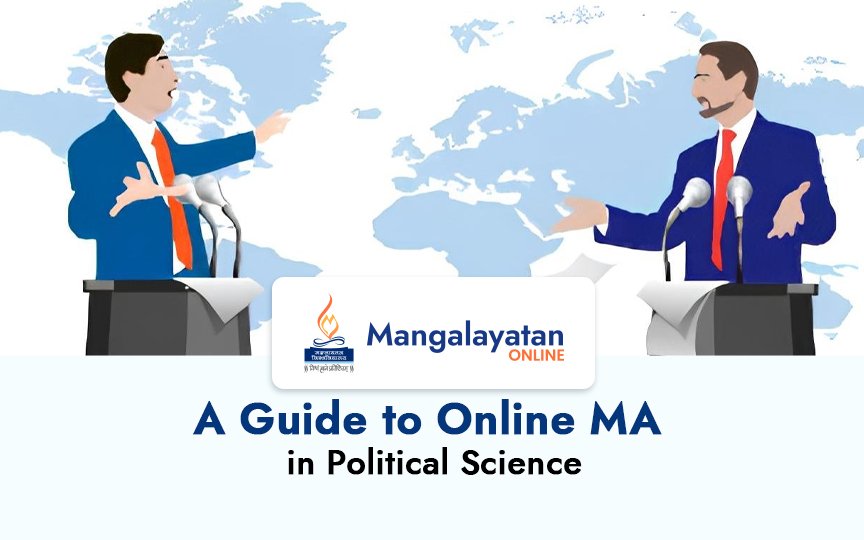In today’s fast-paced and ever-evolving world, the pursuit of higher education has transformed significantly, offering a range of flexible options tailored to meet the diverse needs of learners. Online learning platforms have emerged as a game-changer, reshaping our approach to knowledge acquisition and making education more accessible than ever before. This innovative shift is particularly evident in the field of Political Science, where an Online Master’s Degree provides a distinctive opportunity for students to explore and analyze the intricate dynamics of governance, international relations, and political theory.
Enrolling in an Online MA in Political Science allows learners to engage with complex political concepts and contemporary issues from the convenience of their own homes or wherever they may be. Students can immerse themselves in various subjects such as comparative politics, public policy, and political economy, all while participating in collaborative discussions and interactive assignments with peers from diverse backgrounds.
Moreover, this level of flexibility enables individuals to balance their academic pursuits with personal and professional responsibilities, making it a feasible option for working professionals, parents, or anyone with a busy schedule. As students advance through the program, they can apply their learning in real-world contexts, enriching their understanding and enhancing their career prospects in law, government, international organizations, and non-profit sectors. Overall, an Online MA in Political Science is not just a degree; it’s a pathway to a deeper comprehension of the political landscape, equipping graduates with the skills and knowledge necessary to become informed and influential participants in today’s global society.
What to Expect: Core Topics and Beyond in an Online MA in Political Science
An Online Master’s in Political Science offers a comprehensive exploration of various essential subjects that shape our understanding of governance and political dynamics.
- Political Theory: This foundational component delves into the core concepts that underpin political thought, such as democracy, justice, liberty, and the intricate role of the state in society. Students engage with philosophical texts and ideas, fostering a deep understanding of how these principles influence political ideologies and practices.
- Comparative Politics: In this area of study, learners analyze and compare political systems, institutions, and processes across a diverse array of countries. Through case studies and comparative analysis, students gain insights into how different governmental structures operate, the effectiveness of various political strategies, and the impact of culture on politics.
- International Relations: This segment investigates pressing global issues, including warfare, peacekeeping efforts, diplomacy, and the functions of international organizations. Students explore the complexities of global interactions and the role of states and non-state actors in shaping international policies and relations.
- American Politics: Focusing specifically on the United States, this course examines the historical evolution of the American political system, its key institutions, such as Congress and the Presidency, and the contemporary challenges it faces. Students study electoral processes, public policy, and the impact of political parties on the American landscape.
- Research Methods: Essential for developing robust analytical skills, this coursework equips students with the tools needed for effective political research. Emphasis is placed on data analysis techniques, qualitative research methodologies, and the principles of scholarly writing, enabling students to critically assess and contribute to political discourse.
Through these diverse subjects, an Online MA in Political Science prepares students for a range of careers in public policy, international relations, academia, and beyond, cultivating a well-rounded perspective on the intricacies of politics in the modern world.
Beyond these core areas, students may have the opportunity to specialize in areas such as:
- Political Communication: Analyzing the role of media, propaganda, and public opinion in shaping political discourse.
- Environmental Politics: Exploring the intersection of environmental issues and political decision-making.
- Human Rights: Investigating the protection and promotion of human rights on a global scale.
- Public Policy: Examining the development and implementation of public policies at various levels of government.
Important Facts and Statistics:
Career Outlook
Graduates with an online MA in Political Science can pursue a wide range of careers, including:
- Government Service: Working for government agencies at local, state, and federal levels.
- Non-profit Organizations: Advocating for social and political change in various sectors.
- Research and Academia: Conducting research, teaching at the university level, or working in think tanks.
- International Organizations: Contributing to global efforts in areas such as diplomacy and development.
- Journalism and Media: Reporting on political events and analyzing political trends.
Online Learning Benefits
- Flexibility: Learn at a speed that works for you and pick the times that fit your life.
- Accessibility: You can access your course materials and communicate with teachers and fellow students from anywhere as long as you have an internet connection.
- Affordability: Online programs can often be more cost-effective than traditional on-campus programs.
Choosing the Right Program
- Accreditation: Ensure the program is accredited by a recognized accrediting body.
- Faculty Expertise: Research the faculty’s credentials and areas of specialization.
- Technology and Support: Evaluate how good online learning platforms are, including the help available for technical problems and the support services for students.
- Curriculum: Review the curriculum to ensure it aligns with your career goals and interests.
Recent Research in Online Political Science
- The Impact of Online Platforms on Political Participation: Researchers are investigating how social media and other online platforms are shaping political discourse, influencing voter behavior, and facilitating political mobilization.
- The Rise of Populism and the Role of Online Echo Chambers: Studies are examining how online echo chambers and filter bubbles contribute to the rise of populism and political polarization.
- The Use of Big Data and Artificial Intelligence in Political Analysis: Researchers are exploring the use of big data and AI techniques to analyze political trends, predict election outcomes, and improve public policy decision-making.
- The Ethics of Algorithmic Governance: Scholars are grappling with the ethical implications of using algorithms to make political decisions, such as in areas like targeted advertising and predictive policing.
Conclusion
Pursuing an MA Political Science Online presents an exceptional opportunity for individuals eager to expand their knowledge of political systems and frameworks. This degree allows students to critically engage with complex political concepts, cultivate their analytical skills, and gain insights into the intricate dynamics of governance and public policy.

By meticulously exploring various programs, you can identify the one that best aligns with your academic goals and career aspirations. The flexibility offered by online learning accommodates diverse schedules and enhances accessibility, enabling students to balance their studies with personal and professional commitments. Embarking on this educational journey promises not only intellectual enrichment but also the chance to forge a path toward a rewarding career in a vibrant and ever-evolving field.







